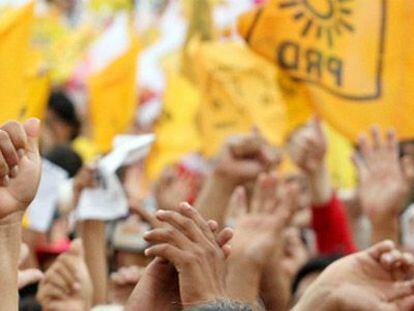Mexico’s leftist party vows to fight Peña Nieto’s Pemex privatization bid
PRD seeks to unite its factions against president’s plans for constitutional reform


Mexico’s Democratic Revolutionary Party (PRD) closed ranks on Tuesday to fight any attempts by President Enrique Peña Nieto to change the Constitution in order to privatize the state-run oil industry. Following several weeks of debate within the leftist party over the Pemex issue, top leaders met to find common ground and take a position on Peña Nieto’s package of proposed reforms, including his plans to open up the oil industry to private investment.
“The left is indispensable and cannot be replaced in a national debate over the future of our petroleum resources,” said the PRD’s national president Jesús Zambrano. He said that the party would not allow the president to change Article 27 of the Mexican Constitution, which lists oil and other natural resources as belonging to the state. Modernizing Petróleos Mexicanos (Pemex) “doesn’t require constitutional reforms,” Zambrano said.
The PRD president appeared before reporters accompanied by Cuauhtémoc Cárdenas, the son of former President Lázaro Cárdenas who nationalized the oil industry in 1938, and former Mexico City Mayor Marcelo Ebrard, who ignited the debate within the PRD by accusing Zambrano and others inside the party of negotiating with Peña Nieto by specifically signing on to the government’s Pact for Mexico.
Tensions over Pemex spawned factions within the PRD, known as “tribes.”
The panic actually started last week when Peña Nieto, who was in London for the G8 summit, told the Financial Times that his energy reform would include “the constitutional changes needed to give private investors certainty.”
What do they want to privatize, and what laws do they plan on reforming"
To accomplish this, the president said that he was counting on his cross-party political agreement, the Pact for Mexico — which was signed last December by the leaders of Mexico’s main parties, including the PRD — to push through a series of reforms and the restructuring of institutions. That timetable for 95 reforms was also signed by Peña Nieto’s Institutional Revolutionary Party (PRI) and the National Action Party (PAN).
Meanwhile, Cárdenas, the PRD founder, challenged the Peña Nieto government to announce to the nation “what it wants to privatize,” and explain “what procedures it will be using and what laws it plans on reforming.
“They must provide us with figures, tell us where the money should be going, and explain why they cannot obtain loans,” he said, adding that the Constitution does not need to be changed with regard to the oil industry.
“The PRD had prepared a very important reform concerning the energy sector,” said the capital’s former mayor, Ebrard. “There should be changes, but no changes are needed to the Constitution,” he added.
Last week, the former Mexico City mayor, who served from 2006 to 2012, had a public confrontation with Zambrano, whom he accused of not being up front with the PRD concerning the Pact for Mexico. Zambrano, for his part, had flung some colorful accusations back at Ebrard. “He is like a drunkard in a bar who is under the table and asking everyone what they are looking at so he can start a fight with someone who doesn’t want to fight,” he said.
Nationalized by President Cárdenas in 1938, Pemex accounts for one-third of the government's revenues, given that it takes 67 percent of all its sales. This is a much higher percentage than that levied by the government in Venezuela on sales by its own state-oil company Petróleos de Venezuela (Pdvsa), which is 39 percent.
In 2000, Pemex was ranked the sixth-largest petroleum company in the world, but now it is the 11th. Analysts have said that it is in dire need of restructuring.











































